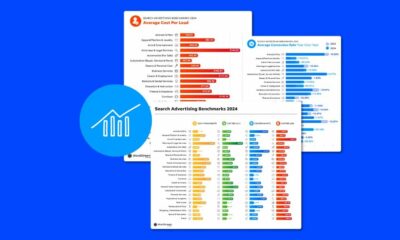SEO
15 Tips To Increase Your Brand Awareness

Guest posting could rightly be called the black sheep of SEO strategies.
Its very name conjures up images of black hats and spammy link tactics the industry has long left behind.
Does this mean guest posting should be trashed?
In my experience, guest posting has created dozens of business opportunities and leads my company has been able to exploit for profit.
Instead of focusing on guest posting as a link-building strategy, we need to shift our focus to a brand-building strategy.
In this article, you’ll learn guest posting tips to not only provide your site SEO value but to help build your brand, too.
Benefits of Guest Posting: Is It Still Worth It?
SEO practitioners have been “beating a dead horse” for so long that they should rank #1 for the term.
However, like link building and all of the other things in SEO we think are dead, guest posting is still a viable opportunity for thought leadership and awareness PR.
While links from guest posting are largely treated as nofollow links, I find that the business opportunities and brand exposure from posting on sites like SEJ and other prominent blogs are sufficient to warrant the effort.
I would list the benefits of guest posting as follows:
- Increased brand awareness.
- Viable backlinking opportunities (even if they are nofollow).
- Thought leadership.
- Increased site traffic.
- Increased leads and business opportunities.
Furthermore, having your authorship spread across different publications develops your trust and authority more than a hyperlink back to your blog on someone else’s website.
Of course, if you want to engage in guest posting, you need to have the proper focus and expectations in place.
That’s why I’ve listed 15 tips to maximize your guest posting campaign and increase your brand awareness.
1. Stick To Your Niche & Exploit Your Expertise
If you’re a digital marketer that focuses on content in your business, write about content.
Exclusive to video marketing? Offer guest content about video marketing.
True experts have a narrow focus and tend to stay in their lane.
The key to expertise is pretty simple: You should actually be an expert in whatever you are writing about.
If you write professionally about multiple subjects, you risk muddying your brand and confusing search engine evaluation of your content.
For example, my main focuses for guest posting are content creation (such as this post), productivity, and time management.
I’m also an editor for a popular motorcycle publication, but I don’t guest post in that industry.
That’s a different story because it’s like being a staff writer at Search Engine Journal. You likely won’t find full-time staffers guest posting on other digital marketing publications.
There may be certain circumstances where you’ll write about something that’s not your full focus.
The odd exception is OK. But in general, stick to your area of expertise when guest posting.
2. Create All The Evergreen Content You Can
You want your work to stick around for as long as possible, so focus on creating evergreen content.
Experts are often approached for opinions about newsworthy items.
Don’t deny those opportunities, but remember that guest posting is different. You aren’t necessarily going for a big splash, but longevity.
Create content that will have the same relevancy 10 years from now as it does today.
That may be challenging for ever-changing industries such as technology – but try to create as much evergreen content as possible.
Because I mostly write about creating content and productivity, much of my content can remain evergreen.
My personal rule is to aim for guest post content that is 90% evergreen and 10% newsworthy or trending.
3. Target Relevant, Strong Websites
Many SEO professionals focus on the domain authority (DA) of a website. But that single element doesn’t tell the entire story of a website’s strength.
You’ll still see a lot of websites with higher DAs but thin web page copy. These may be loaded with external links that are irrelevant to the core focus of the website.
Mistaking a high DA for a good, relevant website can derail your guest posting efforts.
Don’t chase just a strong DA.
Look for high-quality websites loaded with reputable content written by experts.
Two things to ask upfront are for traffic metrics and whether the site buys links (or “exchanges” them for money, as the case may be).
You should check their link profile or have an SEO pro do this for you before even pitching to a publication.
If the website links to irrelevant domains with unworthy content, save your energy and move on to the next target website.
Remember, once again, to concentrate on brand building first and link acquisition second.
If it’s not good for your brand, keep moving.
This will save you much energy as you wade through the web, searching for the best online outlet to amplify your content.
If you suspect anything scammy, especially with link building, let your fingers run and find you another prospective website.
4. Build Your Relationship With Good Publications
When you find a strong website and your guest posts resonate with its audience, do as much as possible for that website.
Some SEO professionals don’t like this idea due to the diminishing value of more links.
Most guest posts only feature a link (make sure it’s followed!) in the bio to the contributor’s home page.
This typically means that the first link is the strongest, and each one afterward has a diminishing return on value.
However, if the publication is strong and you’re influencing its audience, forget about the link value. Focus on building your brand here instead.
Many have this backward, and they end up providing invaluable content that doesn’t resonate well with the audience just to get a link.
5. Optimize Your Bio
Many websites will restrict your ability to link to personal websites throughout your blog, so focus on making your bio as strong as possible.
Most bios allow for a standard headshot, a link to your website, and a one to two-sentence description.
Use your bio to link to a website that will benefit most from it and will be most relevant to your audience. Then, create a description that best captures your brand and appeals to that audience.
You may not realize it, but your bio will often be the thing people click on when they want to learn more about you, so do your best to maximize its potential.
6. Never Forget About SEO
Some guest contributors forget about SEO when creating a guest post (even those within the digital marketing space).
I’ve written multiple articles here about SEO writing if you want to dig in, but the absolute basics include:
- Target one or two keywords per guest blog.
- Use target keywords in an approximately 55-character title.
- Use numbers; headlines with numbers are typically popular with readers.
- Use of brackets or parentheses in the title; Research by HubSpot and Outbrain showed that headlines with bracketed clarifications performed 38% better than those without them.
- Use target keywords in meta descriptions of about 150 characters, with a marketing message and clear call to action (CTA).
- Use related keywords naturally infused into the content.
- Properly use header tags with keywords (related keywords work nicely here).
- Use bold, italics, and bullet points judiciously to make reading easier, improving UX and increasing on-page reading time.
- Offer internal/external linking recommendations.
Again, don’t forget about SEO.
You don’t want to sabotage the chances of that guest post actually being discovered.
7. Go Long And Mention Other Relevant & Link-Worthy Sources
Don’t skimp on length.
Search engines want to represent articles with serious value, and it’s much easier to provide value with longer posts.
That doesn’t mean anything fluffy, but well thought out and written.
Our in-house evaluation of clients’ blog content (Disclosure: I’m the founder of ContentMender) showed that a minimum word count of 1,200 words was required, though most guest posts we do are around 1,500 words.
I recommend going even longer at 2,500 words per piece, which is, on average, what I do here at Search Engine Journal.
Quote other experts within your article, especially if they write for the publication where you’re guest posting.
Want to get even better results?
Try to get a direct, unique quote from an author or expert within your industry.
8. Remember To Amplify
Like writing without SEO in mind, not exploiting a guest post is another huge problem.
Once a story goes live, push it out on all of your social channels and try to influence others to share further. Make sure to tag the publication and every person mentioned.
Another tactic that works well is linking to the article on your main website. I do this through an “In The Media” page on my WordPress website that uses a Nooz plugin.
Beyond this, I recommend fairly traditional strategies, even sharing posts on Twitter, Facebook, LinkedIn, and appropriate Reddit communities that could benefit.
9. Refer To Your Other Published Guest Posts
If you have more than one guest post published in the same niche, try to link to the other articles as much as possible.
Sometimes the publications won’t allow links, especially if they are directed toward a competitor, but most times, you will get them linked.
This creates synergy between all of your guest posts across the web and helps search engines connect all of your guest posting efforts.
10. Find Guest Post Opportunities & Perfect Your Pitch
Finding opportunities online is easy.
Simply Google the following, preceded by your industry keyword (e.g., “SEO guest post guidelines”):
- Guest post submissions.
- Accepting guest posts.
- Guest post guidelines.
- Submit a guest post.
Once you find the ideal publication, the next challenge is the pitch.
Here are a few points to consider when pitching as a guest poster:
- Make each pitch personal. Find out who the managing person is and call them by their first name. Research that person to get a feel of their language. Do they use big words? Small words? Hobbies? Etc.
- Talk informally. You do not want them to feel like they are reading a script.
- Keep your initial email short and to the point.
- Provide a list of topics you are proposing.
- Provide some credentials of work you had published online (the more relevant to the publication, the better).
- Let them know you understand how to create search-friendly content.
- If a previous post is ranking highly on Google for a target keyword, share that info within the pitch. Say something like, “If you search Google for content writing trends 2021, you’ll see how my latest guest post is doing.”
Though I don’t see the author tag becoming a relevant ranking factor , the more mentions you have online, the stronger your brand and associated businesses will grow.
Remember, links are the added benefit to the work of guest posting – so make sure you’ve also planned a proper link building strategy by focusing on higher return on investment (ROI) pages on your website(s).
11. Protect Your Guest Posts
Guest posting is a portion of an overall awareness PR strategy that should also involve other means of brand exposure.
Remember that although you have contributed the guest post, you don’t own that asset.
Publications can fold or change their content marketing strategies quickly, and poof – your work can disappear.
The solution is two-fold.
First, always keep a final copy of your guest posts saved somewhere.
I did work for a publication over a decade ago and found out a few years ago that the publication ran out of funds and disappeared from the web. Thankfully, I had all of my original stories and was able to refresh and reuse them without the penalty of duplicate content.
Make sure you search the article to ensure it wasn’t scraped and used on other websites.
Secondly, put more effort into your “home base” content. This is content you own that is published on your own platforms: books, ebooks, and your web pages/blogs.
12. Engage With Posts
Cultivate greater engagement on your posts by reacting to comments on the post itself and on social media.
Similar to reviews, be sure to track your posts across social media and engage with all comments to generate a buzz.
Even though that post is being used on another person’s website, it’s your brand that is getting most of the recognition.
13. Track Your Posts
Tracking your guest posts can be a helpful way to organize your project management and see what leads and results you are getting.
SEMrush provides a Post Tracking tool that tracks social media engagement, links, and keyword rankings of various guest posts.
It’s never a bad idea to link to posts you’ve written on other sites on your own blog – or other sites!
Creating a flourishing ecosystem and breadcrumb trail of thought leadership will help you develop your brand and authority.
14. Stay On The Right Side Of Google’s Guidelines
One word of caution: Google released some guidelines to be aware of when contributing content to other online publications.
Here’s what Google is against:
- Stuffing keyword-rich links to your site in your articles.
- Using or hiring article writers that aren’t knowledgeable about the topics they’re writing about.
- Using the same or similar content across these articles.
- Duplicating the full content of articles found on your own site (in which case use of rel=”canonical,” in addition to rel=”nofollow,” is advised).
Search Engine Journal’s Roger Montti wrote a great piece about Google penalizing websites that accept guest posts, which has some insight into why you must do your due diligence before pitching content to a publication.
Adam Riemer has also written about when you should mark guest posts as sponsored. In short, if you are paying for a guest post spot, you probably should.
Do your homework!
15. Continue To Leverage Guest Posting
With that said, I recommend improving your guest posting strategy by doing it more frequently.
The more publications you can spread your authorship to, the more awareness you’ll generate.
Implement consistent guest posting into your marketing strategy to increase your thought leadership and site traffic.
In Conclusion
Guest posts can offer great value to your link-building and branding strategies if you are willing to invest the time.
While the links may not be that valuable from an SEO perspective, they are invaluable from an overall marketing and brand perspective.
More resources:
Featured Image: Roman Samborskyi/Shutterstock
SEO
Why Google Can’t Tell You About Every Ranking Drop

In a recent Twitter exchange, Google’s Search Liaison, Danny Sullivan, provided insight into how the search engine handles algorithmic spam actions and ranking drops.
The discussion was sparked by a website owner’s complaint about a significant traffic loss and the inability to request a manual review.
Sullivan clarified that a site could be affected by an algorithmic spam action or simply not ranking well due to other factors.
He emphasized that many sites experiencing ranking drops mistakenly attribute it to an algorithmic spam action when that may not be the case.
“I’ve looked at many sites where people have complained about losing rankings and decide they have a algorithmic spam action against them, but they don’t. “
Sullivan’s full statement will help you understand Google’s transparency challenges.
Additionally, he explains why the desire for manual review to override automated rankings may be misguided.
Two different things. A site could have an algorithmic spam action. A site could be not ranking well because other systems that *are not about spam* just don’t see it as helpful.
I’ve looked at many sites where people have complained about losing rankings and decide they have a…
— Google SearchLiaison (@searchliaison) May 13, 2024
Challenges In Transparency & Manual Intervention
Sullivan acknowledged the idea of providing more transparency in Search Console, potentially notifying site owners of algorithmic actions similar to manual actions.
However, he highlighted two key challenges:
- Revealing algorithmic spam indicators could allow bad actors to game the system.
- Algorithmic actions are not site-specific and cannot be manually lifted.
Sullivan expressed sympathy for the frustration of not knowing the cause of a traffic drop and the inability to communicate with someone about it.
However, he cautioned against the desire for a manual intervention to override the automated systems’ rankings.
Sullivan states:
“…you don’t really want to think “Oh, I just wish I had a manual action, that would be so much easier.” You really don’t want your individual site coming the attention of our spam analysts. First, it’s not like manual actions are somehow instantly processed. Second, it’s just something we know about a site going forward, especially if it says it has change but hasn’t really.”
Determining Content Helpfulness & Reliability
Moving beyond spam, Sullivan discussed various systems that assess the helpfulness, usefulness, and reliability of individual content and sites.
He acknowledged that these systems are imperfect and some high-quality sites may not be recognized as well as they should be.
“Some of them ranking really well. But they’ve moved down a bit in small positions enough that the traffic drop is notable. They assume they have fundamental issues but don’t, really — which is why we added a whole section about this to our debugging traffic drops page.”
Sullivan revealed ongoing discussions about providing more indicators in Search Console to help creators understand their content’s performance.
“Another thing I’ve been discussing, and I’m not alone in this, is could we do more in Search Console to show some of these indicators. This is all challenging similar to all the stuff I said about spam, about how not wanting to let the systems get gamed, and also how there’s then no button we would push that’s like “actually more useful than our automated systems think — rank it better!” But maybe there’s a way we can find to share more, in a way that helps everyone and coupled with better guidance, would help creators.”
Advocacy For Small Publishers & Positive Progress
In response to a suggestion from Brandon Saltalamacchia, founder of RetroDodo, about manually reviewing “good” sites and providing guidance, Sullivan shared his thoughts on potential solutions.
He mentioned exploring ideas such as self-declaration through structured data for small publishers and learning from that information to make positive changes.
“I have some thoughts I’ve been exploring and proposing on what we might do with small publishers and self-declaring with structured data and how we might learn from that and use that in various ways. Which is getting way ahead of myself and the usual no promises but yes, I think and hope for ways to move ahead more positively.”
Sullivan said he can’t make promises or implement changes overnight, but he expressed hope for finding ways to move forward positively.
Featured Image: Tero Vesalainen/Shutterstock
SEO
56 Google Search Statistics to Bookmark for 2024
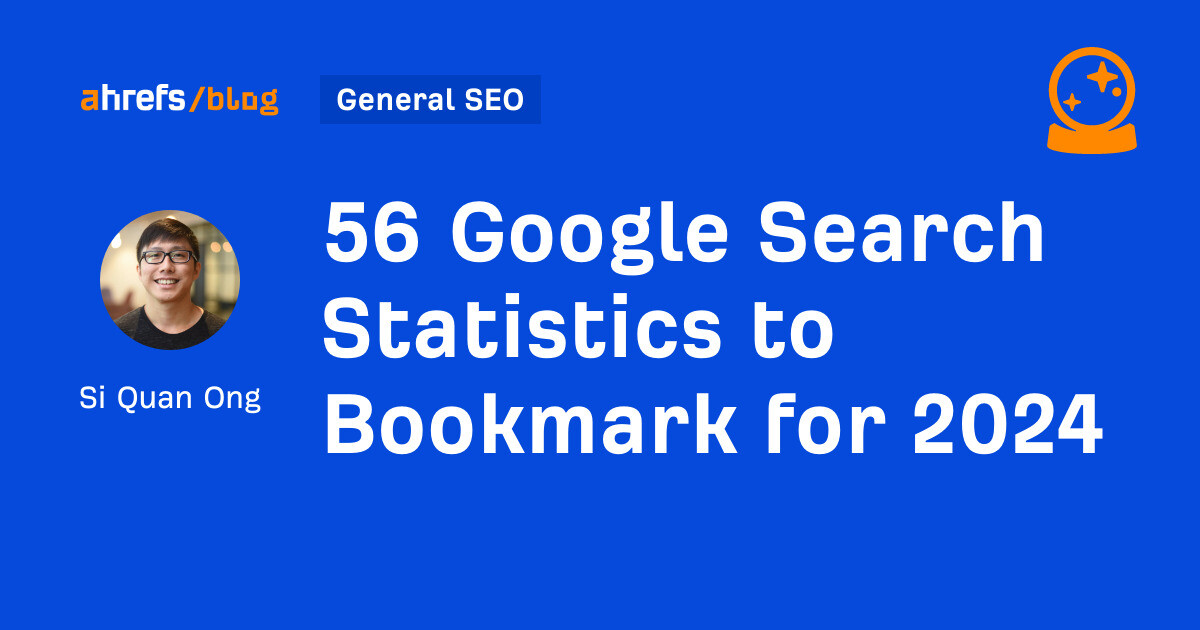
If you’re curious about the state of Google search in 2024, look no further.
Each year we pick, vet, and categorize a list of up-to-date statistics to give you insights from trusted sources on Google search trends.
- Google has a web index of “about 400 billion documents”. (The Capitol Forum)
- Google’s search index is over 100 million gigabytes in size. (Google)
- There are an estimated 3.5 billion searches on Google each day. (Internet Live Stats)
- 61.5% of desktop searches and 34.4% of mobile searches result in no clicks. (SparkToro)
- 15% of all Google searches have never been searched before. (Google)
- 94.74% of keywords get 10 monthly searches or fewer. (Ahrefs)
- The most searched keyword in the US and globally is “YouTube,” and youtube.com gets the most traffic from Google. (Ahrefs)
- 96.55% of all pages get zero search traffic from Google. (Ahrefs)
- 50-65% of all number-one spots are dominated by featured snippets. (Authority Hacker)
- Reddit is the most popular domain for product review queries. (Detailed)
- Google is the most used search engine in the world, with a mobile market share of 95.32% and a desktop market share of 81.95%. (Statista)
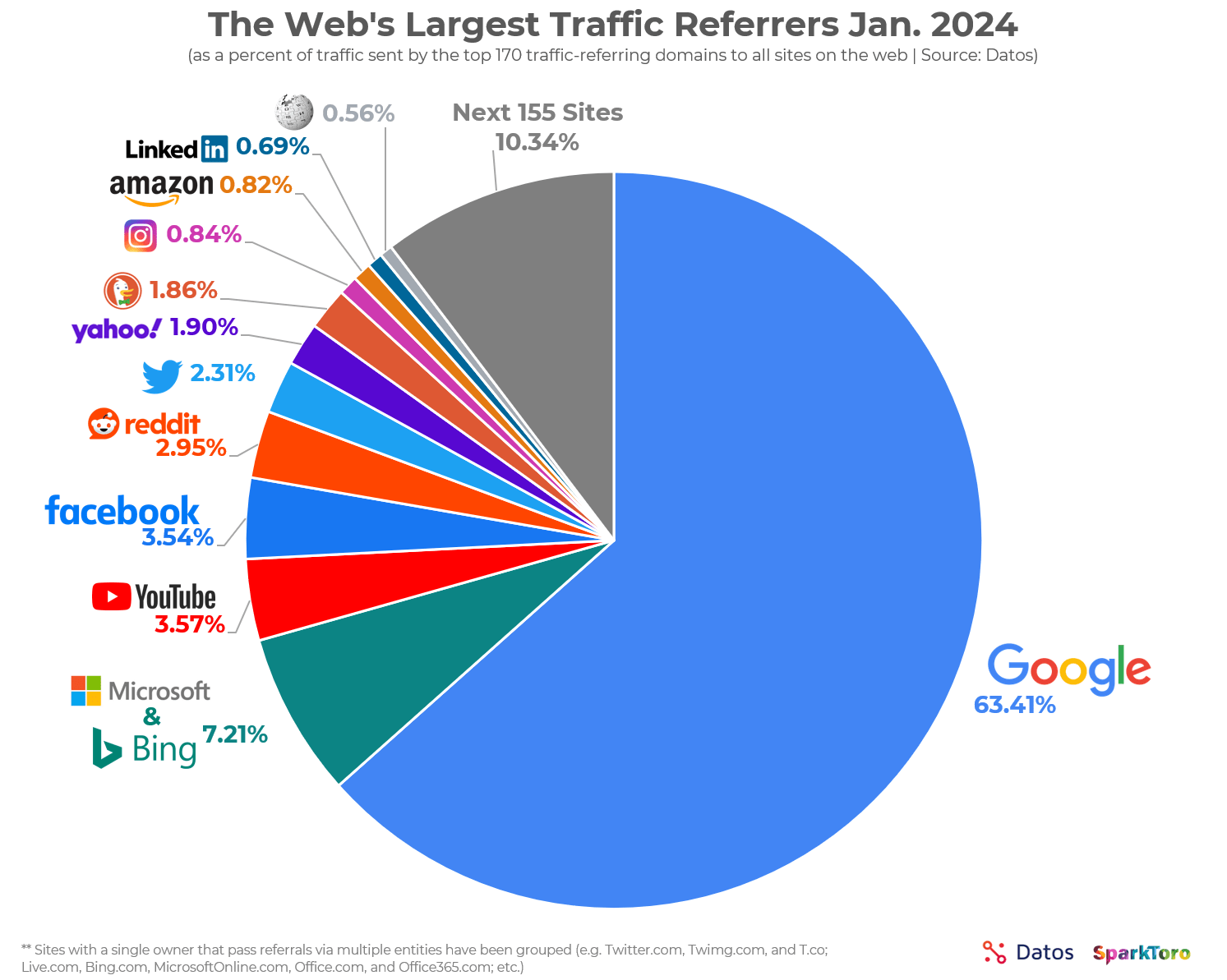

- Google.com generated 84.2 billion visits a month in 2023. (Statista)
- Google generated $307.4 billion in revenue in 2023. (Alphabet Investor Relations)
- 63.41% of all US web traffic referrals come from Google. (SparkToro)
- 92.96% of global traffic comes from Google Search, Google Images, and Google Maps. (SparkToro)
- Only 49% of Gen Z women use Google as their search engine. The rest use TikTok. (Search Engine Land)
- 58.67% of all website traffic worldwide comes from mobile phones. (Statista)
- 57% of local search queries are submitted using a mobile device or tablet. (ReviewTrackers)
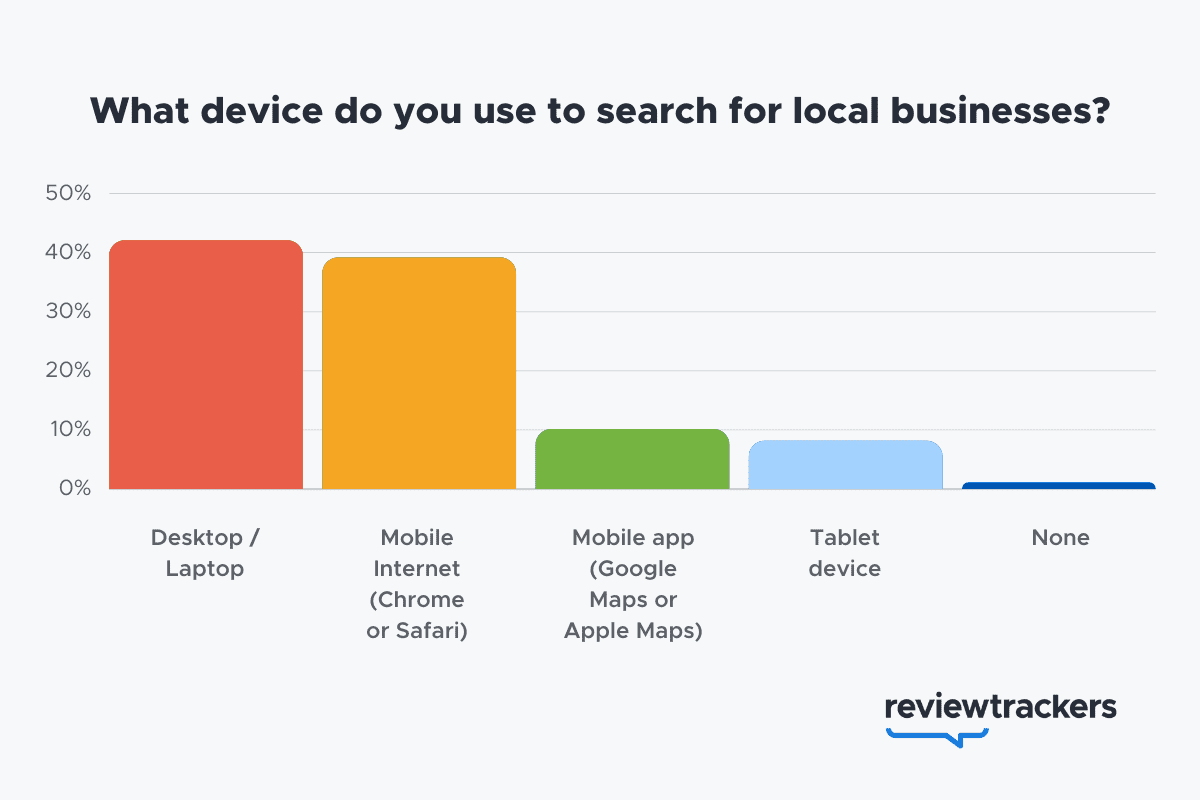

- 51% of smartphone users have discovered a new company or product when conducting a search on their smartphones. (Think With Google)
- 54% of smartphone users search for business hours, and 53% search for directions to local stores. (Think With Google)
- 18% of local searches on smartphones lead to a purchase within a day vs. 7% of non-local searches. (Think With Google)
- 56% of in-store shoppers used their smartphones to shop or research items while they were in-store. (Think With Google)
- 60% of smartphone users have contacted a business directly using the search results (e.g., “click to call” option). (Think With Google)
- 63.6% of consumers say they are likely to check reviews on Google before visiting a business location. (ReviewTrackers)
- 88% of consumers would use a business that replies to all of its reviews. (BrightLocal)
- Customers are 2.7 times more likely to consider a business reputable if they find a complete Business Profile on Google Search and Maps. (Google)
- Customers are 70% more likely to visit and 50% more likely to consider purchasing from businesses with a complete Business Profile. (Google)
- 76% of people who search on their smartphones for something nearby visit a business within a day. (Think With Google)
- 28% of searches for something nearby result in a purchase. (Think With Google)
- Mobile searches for “store open near me” (such as, “grocery store open near me” have grown by over 250% in the last two years. (Think With Google)
- People use Google Lens for 12 billion visual searches a month. (Google)
- 50% of online shoppers say images helped them decide what to buy. (Think With Google)
- There are an estimated 136 billion indexed images on Google Image Search. (Photutorial)
- 15.8% of Google SERPs show images. (Moz)
- People click on 3D images almost 50% more than static ones. (Google)
- More than 800 million people use Google Discover monthly to stay updated on their interests. (Google)
- 46% of Google Discover URLs are news sites, 44% e-commerce, 7% entertainment, and 2% travel. (Search Engine Journal)
- Even though news sites accounted for under 50% of Google Discover URLs, they received 99% of Discover clicks. (Search Engine Journal)
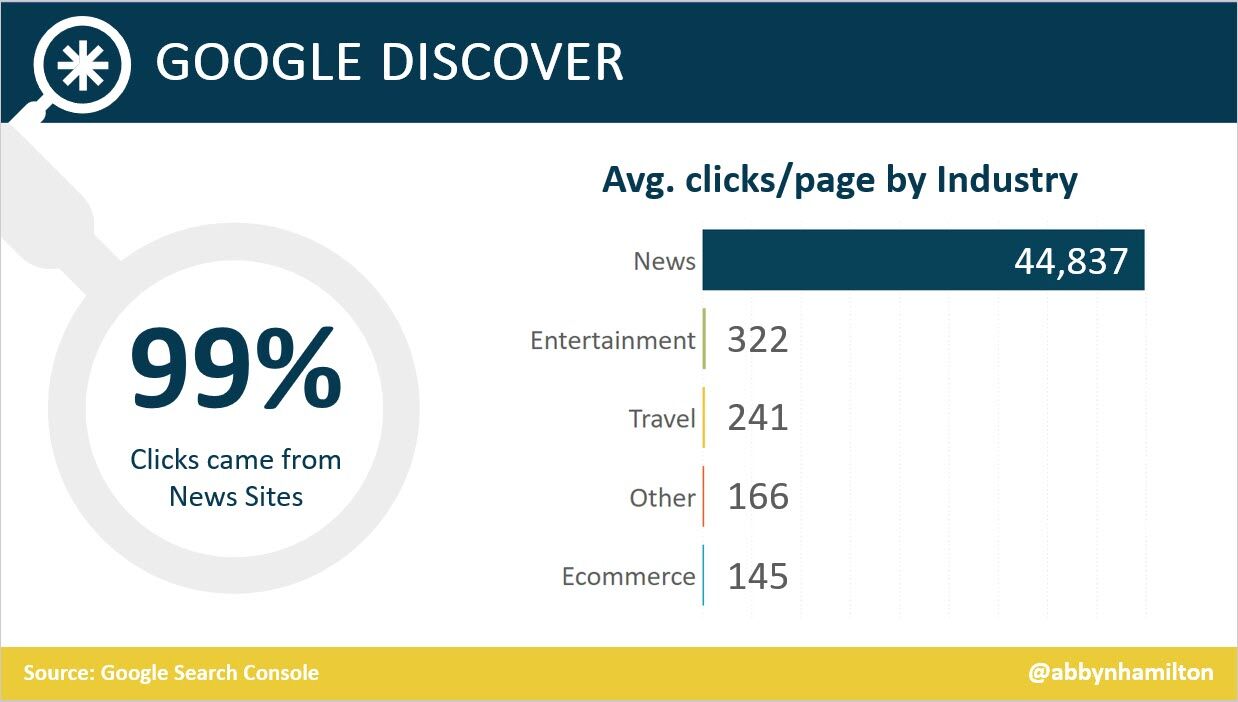

- Most Google Discover URLs only receive traffic for three to four days, with most of that traffic occurring one to two days after publishing. (Search Engine Journal)
- The clickthrough rate (CTR) for Google Discover is 11%. (Search Engine Journal)
- 91.45% of search volumes in Google Ads Keyword Planner are overestimates. (Ahrefs)
- For every $1 a business spends on Google Ads, they receive $8 in profit through Google Search and Ads. (Google)
- Google removed 5.5 billion ads, suspended 12.7 million advertiser accounts, restricted over 6.9 billion ads, and restricted ads from showing up on 2.1 billion publisher pages in 2023. (Google)
- The average shopping click-through rate (CTR) across all industries is 0.86% for Google Ads. (Wordstream)
- The average shopping cost per click (CPC) across all industries is $0.66 for Google Ads. (Wordstream)
- The average shopping conversion rate (CVR) across all industries is 1.91% for Google Ads. (Wordstream)
- 58% of consumers ages 25-34 use voice search daily. (UpCity)
- 16% of people use voice search for local “near me” searches. (UpCity)
- 67% of consumers say they’re very likely to use voice search when seeking information. (UpCity)
- Active users of the Google Assistant grew 4X over the past year, as of 2019. (Think With Google)
- Google Assistant hit 1 billion app installs. (Android Police)
- AI-generated answers from SGE were available for 91% of entertainment queries but only 17% of healthcare queries. (Statista)
- The AI-generated answers in Google’s Search Generative Experience (SGE) do not match any links from the top 10 Google organic search results 93.8% of the time. (Search Engine Journal)
- Google displays a Search Generative element for 86.8% of all search queries. (Authoritas)
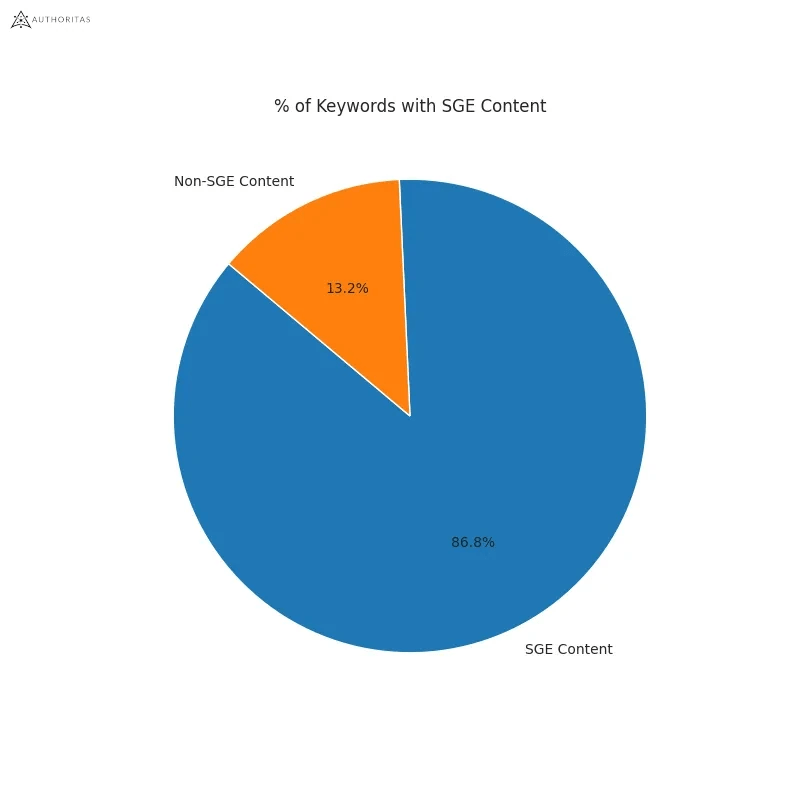

- 62% of generative links came from sources outside the top 10 ranking organic domains. Only 20.1% of generative URLs directly match an organic URL ranking on page one. (Authoritas)
- 70% of SEOs said that they were worried about the impact of SGE on organic search (Aira)
Learn more
Check out more resources on how Google works:
SEO
How To Use ChatGPT For Keyword Research

Anyone not using ChatGPT for keyword research is missing a trick.
You can save time and understand an entire topic in seconds instead of hours.
In this article, I outline my most effective ChatGPT prompts for keyword research and teach you how I put them together so that you, too, can take, edit, and enhance them even further.
But before we jump into the prompts, I want to emphasize that you shouldn’t replace keyword research tools or disregard traditional keyword research methods.
ChatGPT can make mistakes. It can even create new keywords if you give it the right prompt. For example, I asked it to provide me with a unique keyword for the topic “SEO” that had never been searched before.
“Interstellar Internet SEO: Optimizing content for the theoretical concept of an interstellar internet, considering the challenges of space-time and interplanetary communication delays.”
Although I want to jump into my LinkedIn profile and update my title to “Interstellar Internet SEO Consultant,” unfortunately, no one has searched that (and they probably never will)!
You must not blindly rely on the data you get back from ChatGPT.
What you can rely on ChatGPT for is the topic ideation stage of keyword research and inspiration.
ChatGPT is a large language model trained with massive amounts of data to accurately predict what word will come next in a sentence. However, it does not know how to do keyword research yet.
Instead, think of ChatGPT as having an expert on any topic armed with the information if you ask it the right question.
In this guide, that is exactly what I aim to teach you how to do – the most essential prompts you need to know when performing topical keyword research.
Best ChatGPT Keyword Research Prompts
The following ChatGPT keyword research prompts can be used on any niche, even a topic to which you are brand new.
For this demonstration, let’s use the topic of “SEO” to demonstrate these prompts.
Generating Keyword Ideas Based On A Topic
What Are The {X} Most Popular Sub-topics Related To {Topic}?
The first prompt is to give you an idea of the niche.
As shown above, ChatGPT did a great job understanding and breaking down SEO into three pillars: on-page, off-page & technical.
The key to the following prompt is to take one of the topics ChatGPT has given and query the sub-topics.
What Are The {X} Most Popular Sub-topics Related To {Sub-topic}?
For this example, let’s query, “What are the most popular sub-topics related to keyword research?”
Having done keyword research for over 10 years, I would expect it to output information related to keyword research metrics, the types of keywords, and intent.
Let’s see.
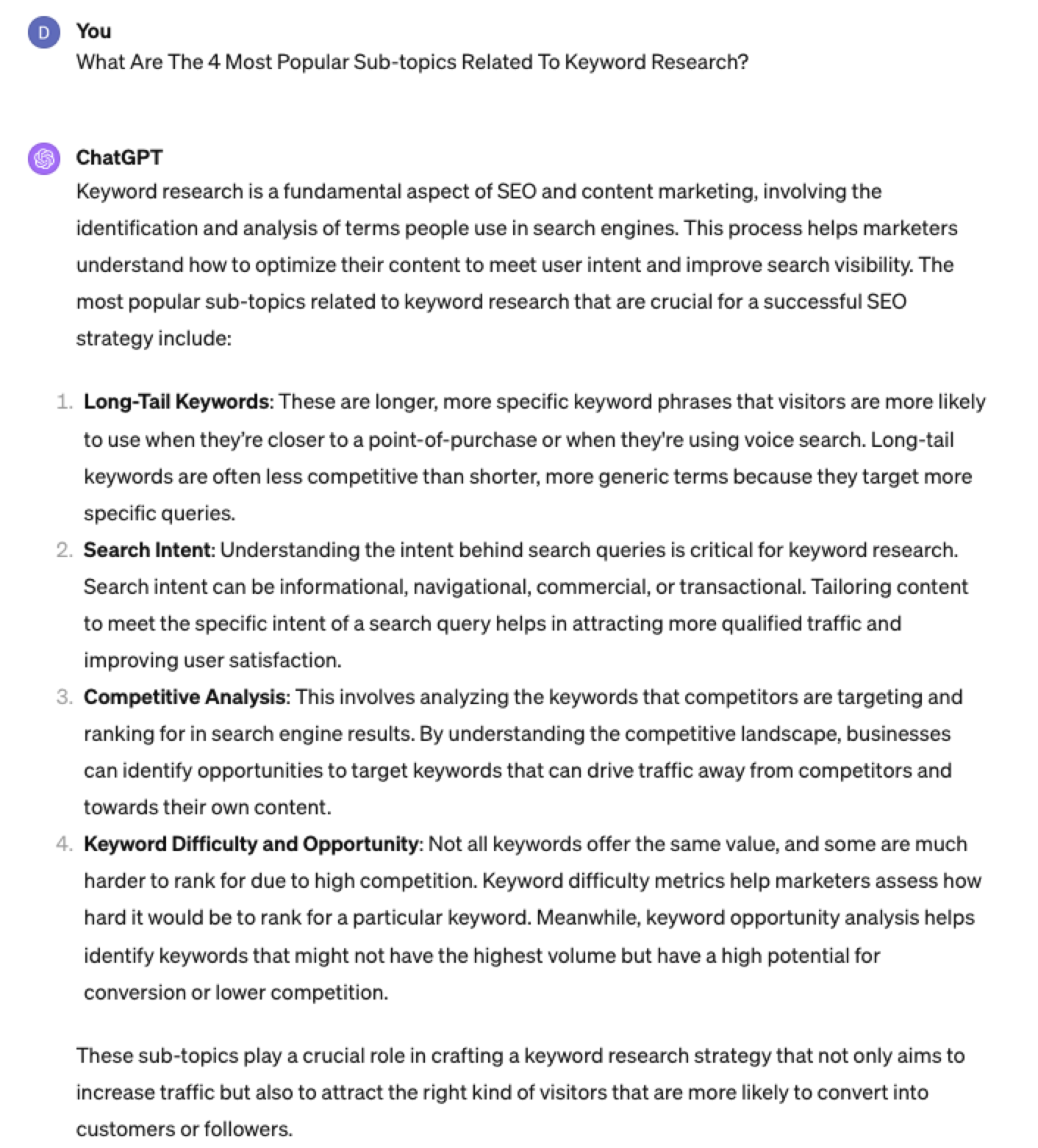 Screenshot from ChatGPT 4, April 2024
Screenshot from ChatGPT 4, April 2024Again, right on the money.
To get the keywords you want without having ChatGPT describe each answer, use the prompt “list without description.”
Here is an example of that.
List Without Description The Top {X} Most Popular Keywords For The Topic Of {X}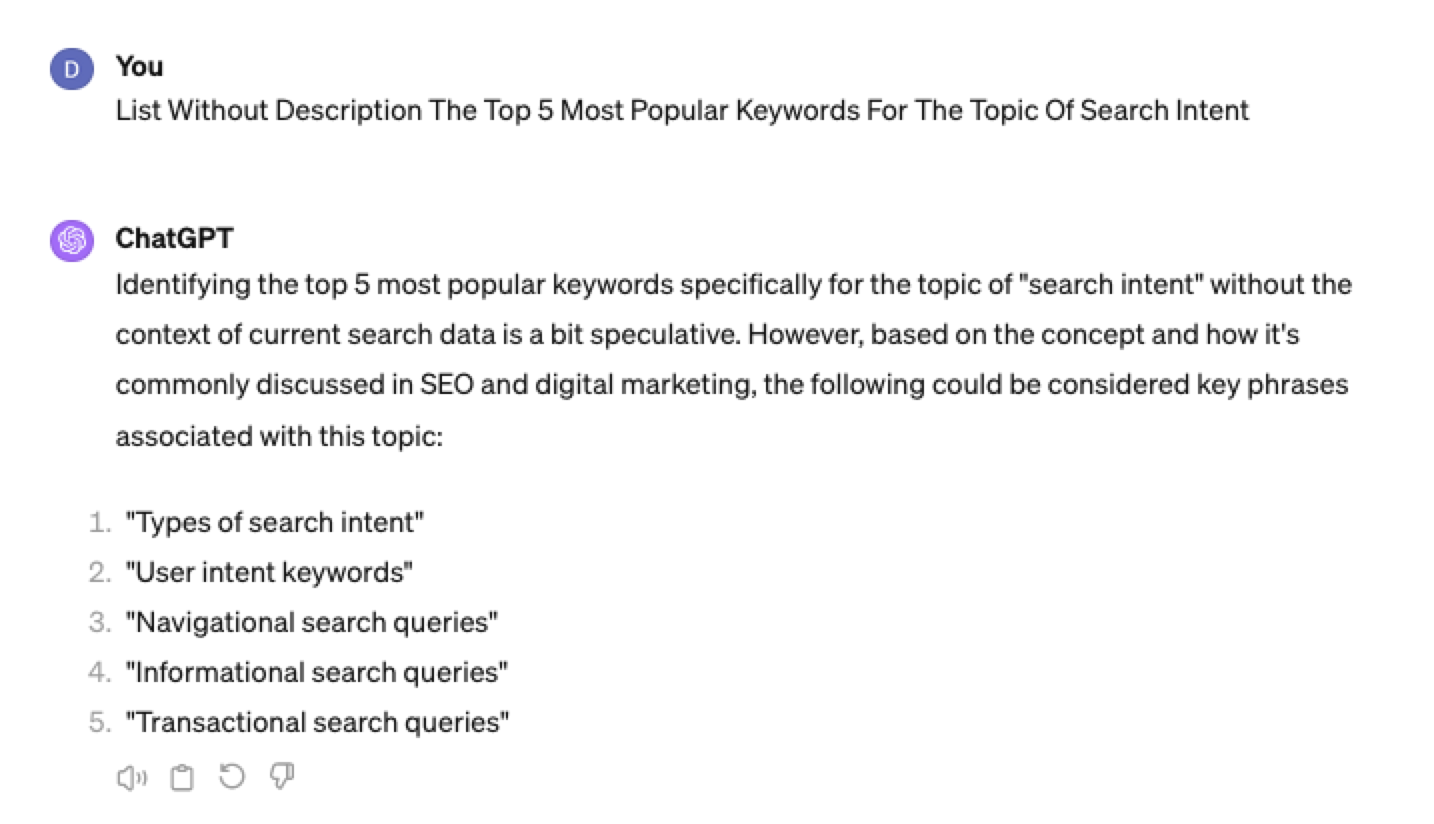
You can even branch these keywords out further into their long-tail.
Example prompt:
List Without Description The Top {X} Most Popular Long-tail Keywords For The Topic “{X}”
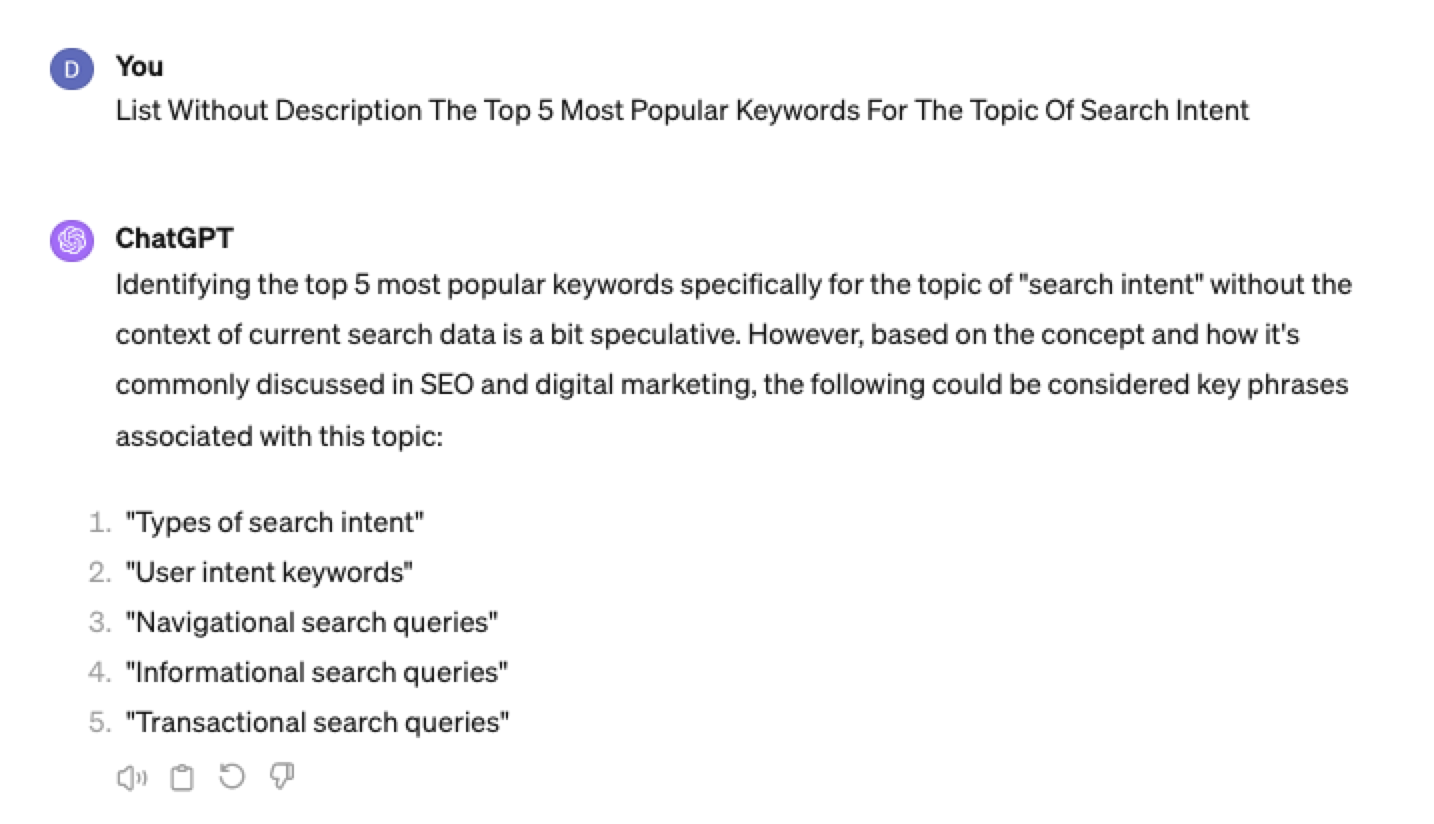 Screenshot ChatGPT 4,April 2024
Screenshot ChatGPT 4,April 2024List Without Description The Top Semantically Related Keywords And Entities For The Topic {X}
You can even ask ChatGPT what any topic’s semantically related keywords and entities are!
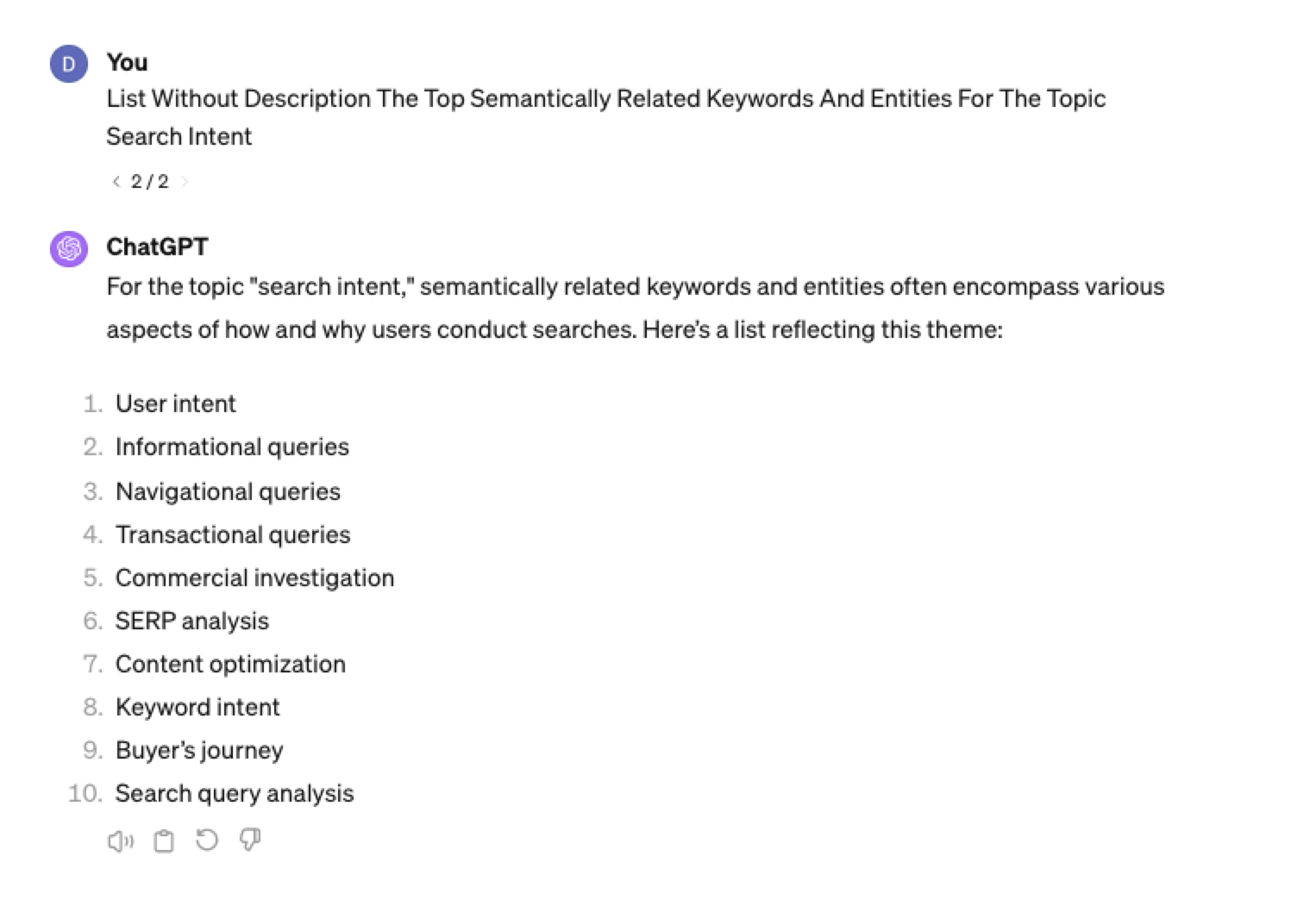 Screenshot ChatGPT 4, April 2024
Screenshot ChatGPT 4, April 2024Tip: The Onion Method Of Prompting ChatGPT
When you are happy with a series of prompts, add them all to one prompt. For example, so far in this article, we have asked ChatGPT the following:
- What are the four most popular sub-topics related to SEO?
- What are the four most popular sub-topics related to keyword research
- List without description the top five most popular keywords for “keyword intent”?
- List without description the top five most popular long-tail keywords for the topic “keyword intent types”?
- List without description the top semantically related keywords and entities for the topic “types of keyword intent in SEO.”
Combine all five into one prompt by telling ChatGPT to perform a series of steps. Example:
“Perform the following steps in a consecutive order Step 1, Step 2, Step 3, Step 4, and Step 5”
Example:
“Perform the following steps in a consecutive order Step 1, Step 2, Step 3, Step 4 and Step 5. Step 1 – Generate an answer for the 3 most popular sub-topics related to {Topic}?. Step 2 – Generate 3 of the most popular sub-topics related to each answer. Step 3 – Take those answers and list without description their top 3 most popular keywords. Step 4 – For the answers given of their most popular keywords, provide 3 long-tail keywords. Step 5 – for each long-tail keyword offered in the response, a list without descriptions 3 of their top semantically related keywords and entities.”
Generating Keyword Ideas Based On A Question
Taking the steps approach from above, we can get ChatGPT to help streamline getting keyword ideas based on a question. For example, let’s ask, “What is SEO?”
“Perform the following steps in a consecutive order Step 1, Step 2, Step 3, and Step 4. Step 1 Generate 10 questions about “{Question}”?. Step 2 – Generate 5 more questions about “{Question}” that do not repeat the above. Step 3 – Generate 5 more questions about “{Question}” that do not repeat the above. Step 4 – Based on the above Steps 1,2,3 suggest a final list of questions avoiding duplicates or semantically similar questions.”
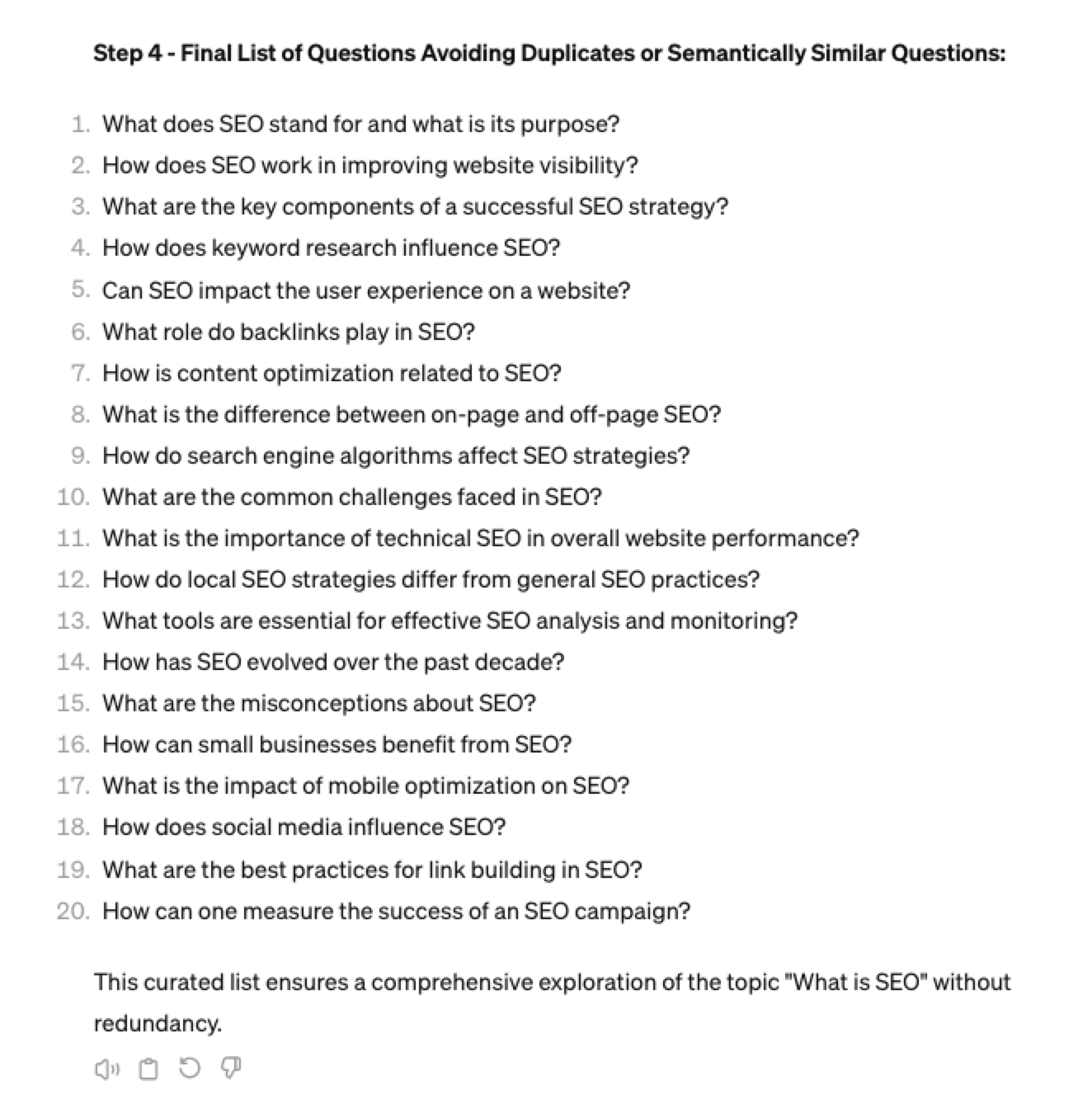 Screenshot ChatGPT 4, April 2024
Screenshot ChatGPT 4, April 2024Generating Keyword Ideas Using ChatGPT Based On The Alphabet Soup Method
One of my favorite methods, manually, without even using a keyword research tool, is to generate keyword research ideas from Google autocomplete, going from A to Z.
-
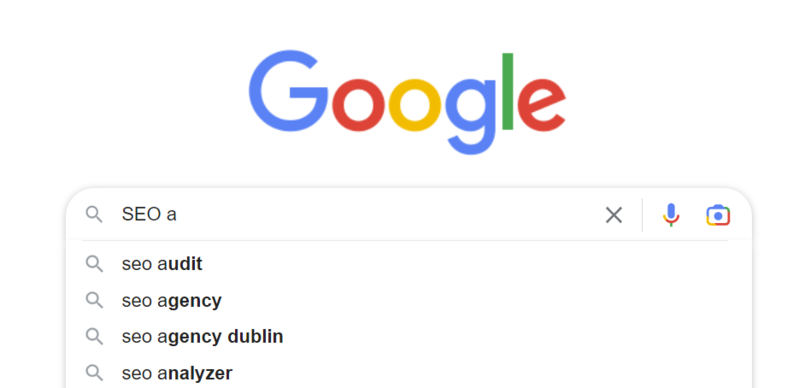 Screenshot from Google autocomplete, April 2024
Screenshot from Google autocomplete, April 2024
You can also do this using ChatGPT.
Example prompt:
“give me popular keywords that includes the keyword “SEO”, and the next letter of the word starts with a”
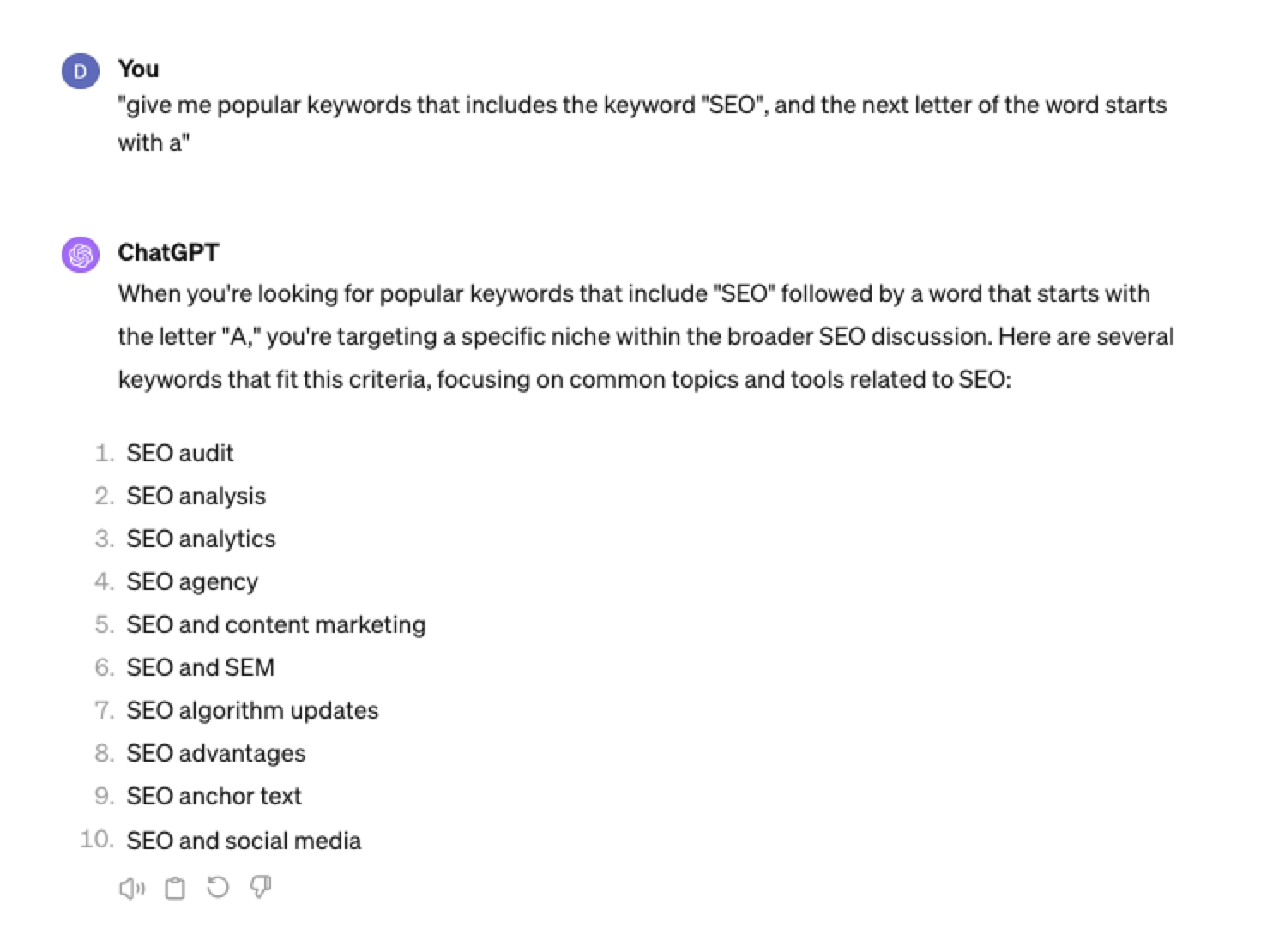 Screenshot from ChatGPT 4, April 2024
Screenshot from ChatGPT 4, April 2024Tip: Using the onion prompting method above, we can combine all this in one prompt.
“Give me five popular keywords that include “SEO” in the word, and the following letter starts with a. Once the answer has been done, move on to giving five more popular keywords that include “SEO” for each letter of the alphabet b to z.”
Generating Keyword Ideas Based On User Personas
When it comes to keyword research, understanding user personas is essential for understanding your target audience and keeping your keyword research focused and targeted. ChatGPT may help you get an initial understanding of customer personas.
Example prompt:
“For the topic of “{Topic}” list 10 keywords each for the different types of user personas”
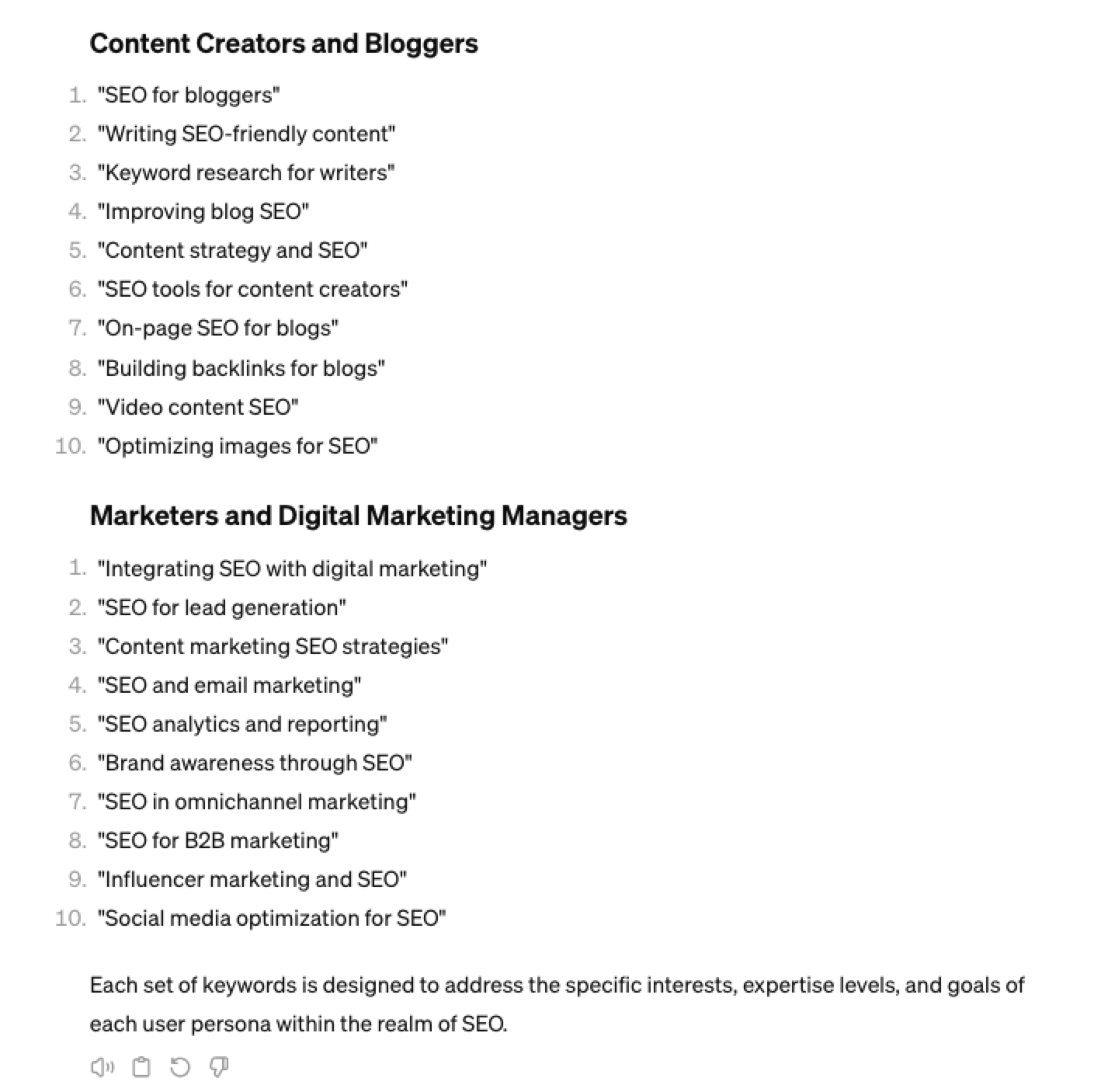 Screenshot from ChatGPT 4, April 2024
Screenshot from ChatGPT 4, April 2024You could even go a step further and ask for questions based on those topics that those specific user personas may be searching for:
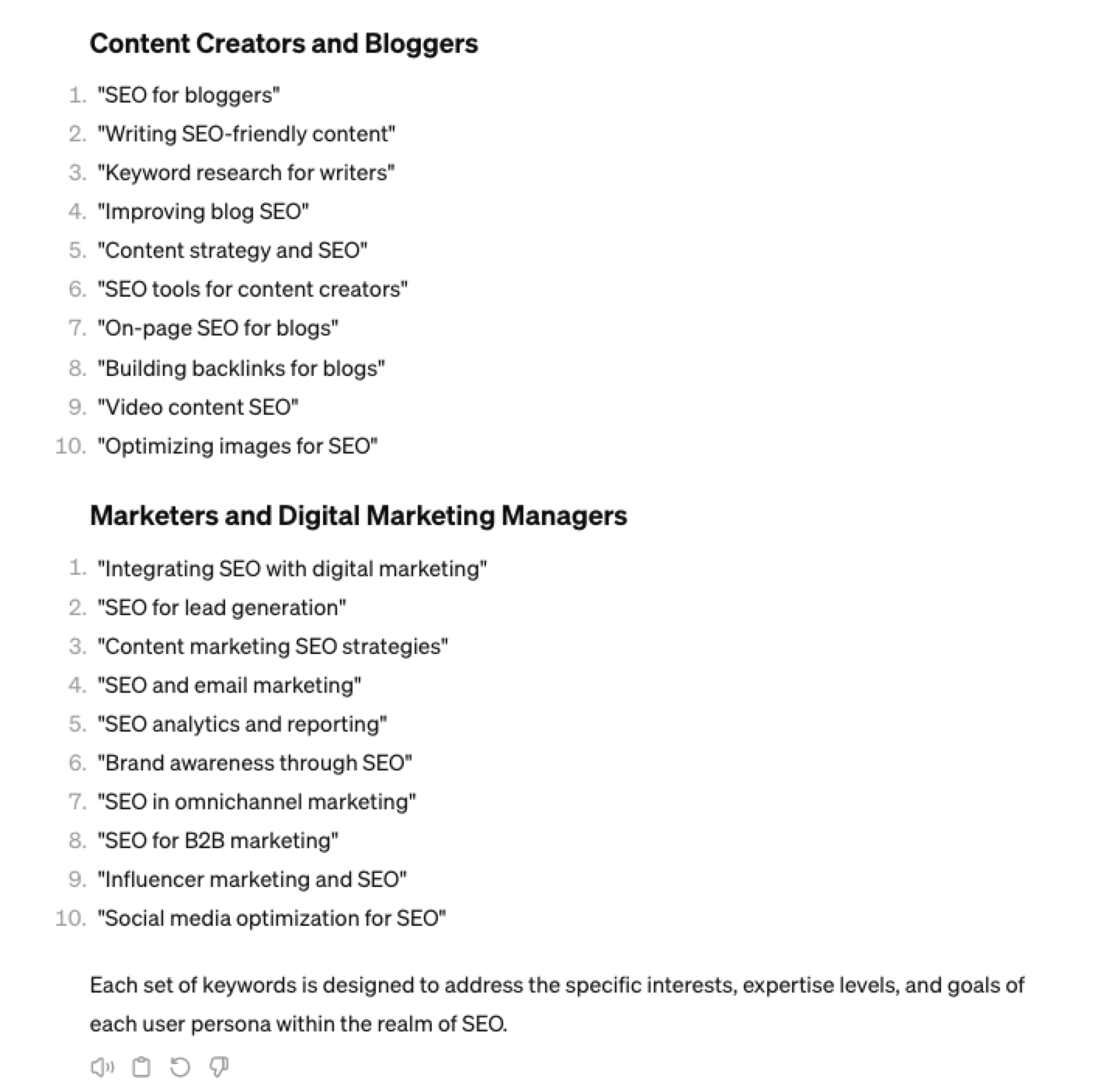 Screenshot ChatGPT 4, April 2024
Screenshot ChatGPT 4, April 2024As well as get the keywords to target based on those questions:
“For each question listed above for each persona, list the keywords, as well as the long-tail keywords to target, and put them in a table”
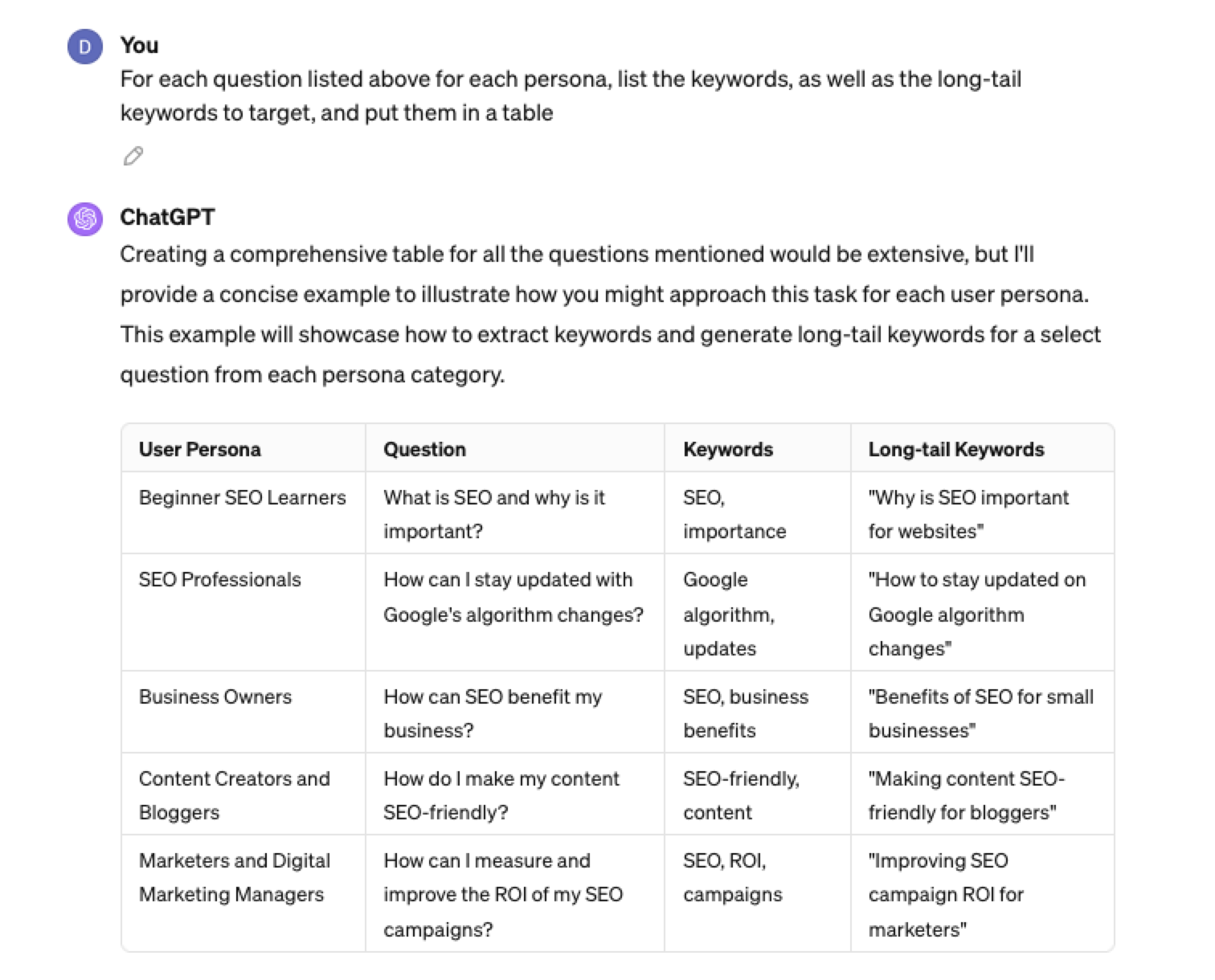 Screenshot from ChatGPT 4, April 2024
Screenshot from ChatGPT 4, April 2024Generating Keyword Ideas Using ChatGPT Based On Searcher Intent And User Personas
Understanding the keywords your target persona may be searching is the first step to effective keyword research. The next step is to understand the search intent behind those keywords and which content format may work best.
For example, a business owner who is new to SEO or has just heard about it may be searching for “what is SEO.”
However, if they are further down the funnel and in the navigational stage, they may search for “top SEO firms.”
You can query ChatGPT to inspire you here based on any topic and your target user persona.
SEO Example:
“For the topic of “{Topic}” list 10 keywords each for the different types of searcher intent that a {Target Persona} would be searching for”
ChatGPT For Keyword Research Admin
Here is how you can best use ChatGPT for keyword research admin tasks.
Using ChatGPT As A Keyword Categorization Tool
One of the use cases for using ChatGPT is for keyword categorization.
In the past, I would have had to devise spreadsheet formulas to categorize keywords or even spend hours filtering and manually categorizing keywords.
ChatGPT can be a great companion for running a short version of this for you.
Let’s say you have done keyword research in a keyword research tool, have a list of keywords, and want to categorize them.
You could use the following prompt:
“Filter the below list of keywords into categories, target persona, searcher intent, search volume and add information to a six-column table: List of keywords – [LIST OF KEYWORDS], Keyword Search Volume [SEARCH VOLUMES] and Keyword Difficulties [KEYWORD DIFFICUTIES].”
-
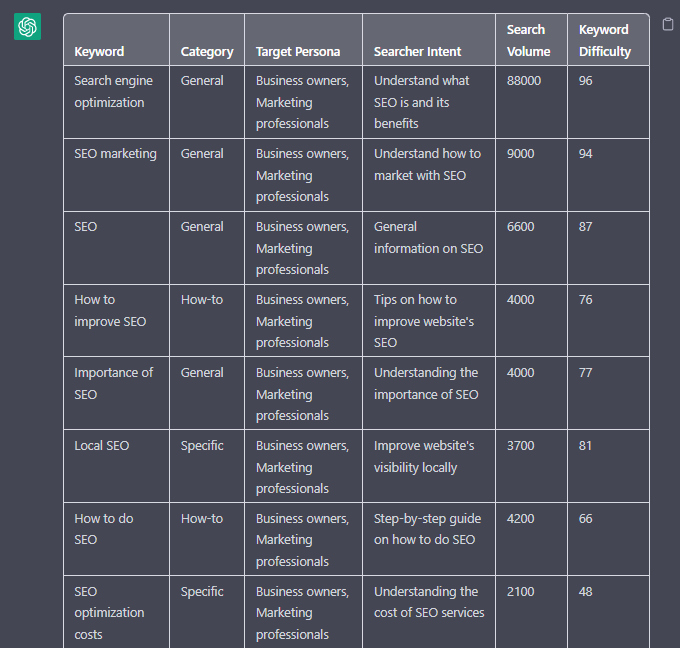 Screenshot from ChatGPT, April 2024
Screenshot from ChatGPT, April 2024
Tip: Add keyword metrics from the keyword research tools, as using the search volumes that a ChatGPT prompt may give you will be wildly inaccurate at best.
Using ChatGPT For Keyword Clustering
Another of ChatGPT’s use cases for keyword research is to help you cluster. Many keywords have the same intent, and by grouping related keywords, you may find that one piece of content can often target multiple keywords at once.
However, be careful not to rely only on LLM data for clustering. What ChatGPT may cluster as a similar keyword, the SERP or the user may not agree with. But it is a good starting point.
The big downside of using ChatGPT for keyword clustering is actually the amount of keyword data you can cluster based on the memory limits.
So, you may find a keyword clustering tool or script that is better for large keyword clustering tasks. But for small amounts of keywords, ChatGPT is actually quite good.
A great use small keyword clustering use case using ChatGPT is for grouping People Also Ask (PAA) questions.
Use the following prompt to group keywords based on their semantic relationships. For example:
“Organize the following keywords into groups based on their semantic relationships, and give a short name to each group: [LIST OF PAA], create a two-column table where each keyword sits on its own row.
-
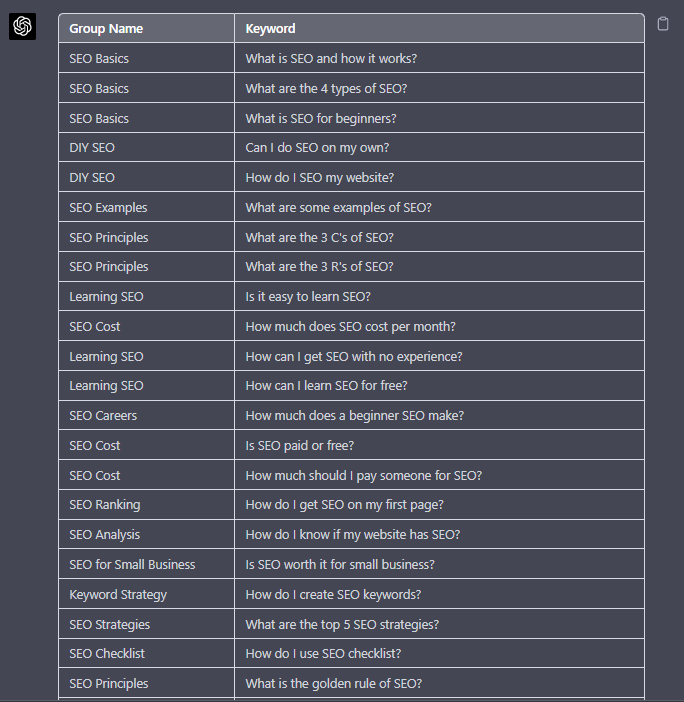 Screenshot from ChatGPT, April 2024
Screenshot from ChatGPT, April 2024
Using Chat GPT For Keyword Expansion By Patterns
One of my favorite methods of doing keyword research is pattern spotting.
Most seed keywords have a variable that can expand your target keywords.
Here are a few examples of patterns:
1. Question Patterns
(who, what, where, why, how, are, can, do, does, will)
“Generate [X] keywords for the topic “[Topic]” that contain any or all of the following “who, what, where, why, how, are, can, do, does, will”
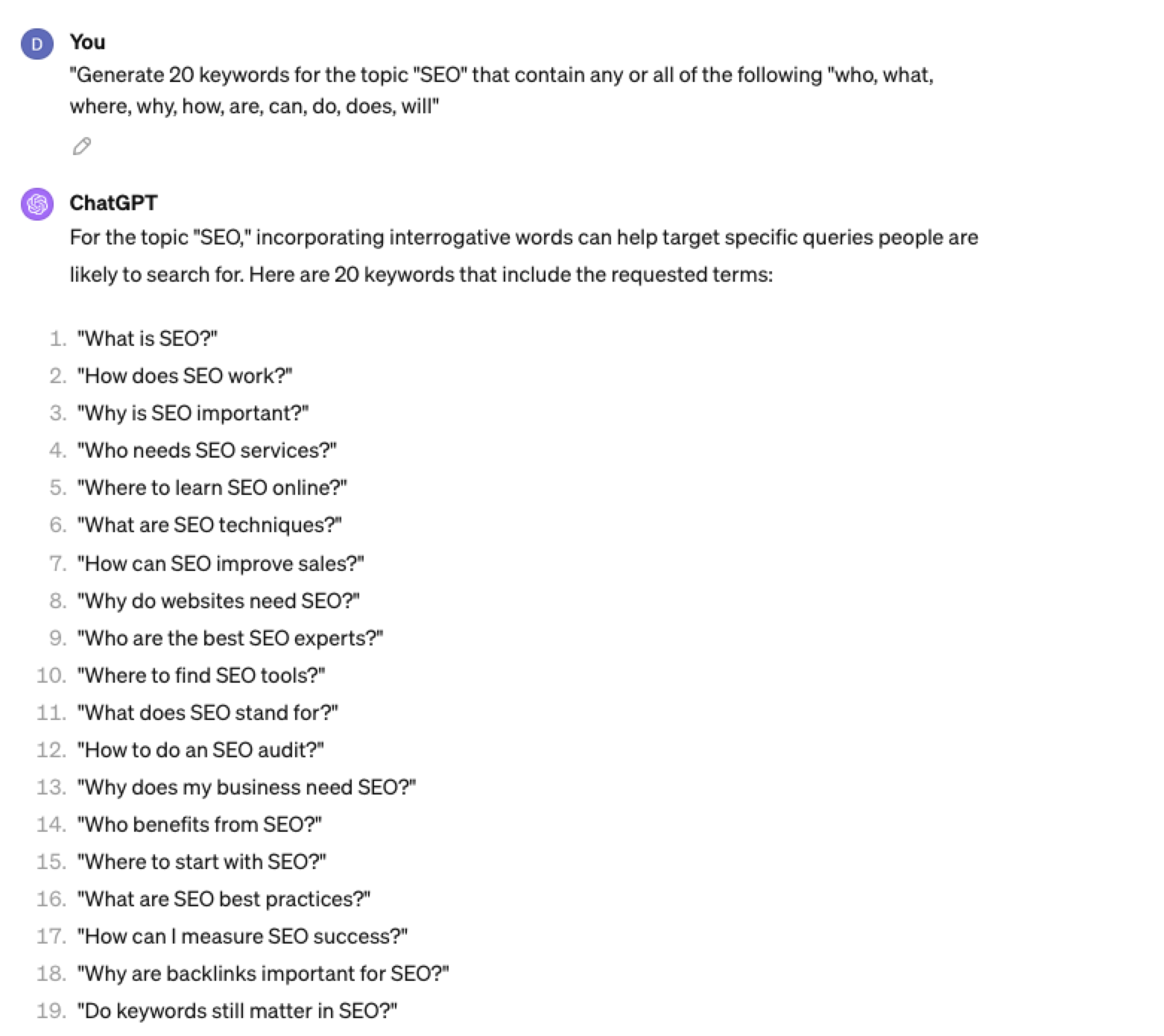 Screenshot ChatGPT 4, April 2024
Screenshot ChatGPT 4, April 20242. Comparison Patterns
Example:
“Generate 50 keywords for the topic “{Topic}” that contain any or all of the following “for, vs, alternative, best, top, review”
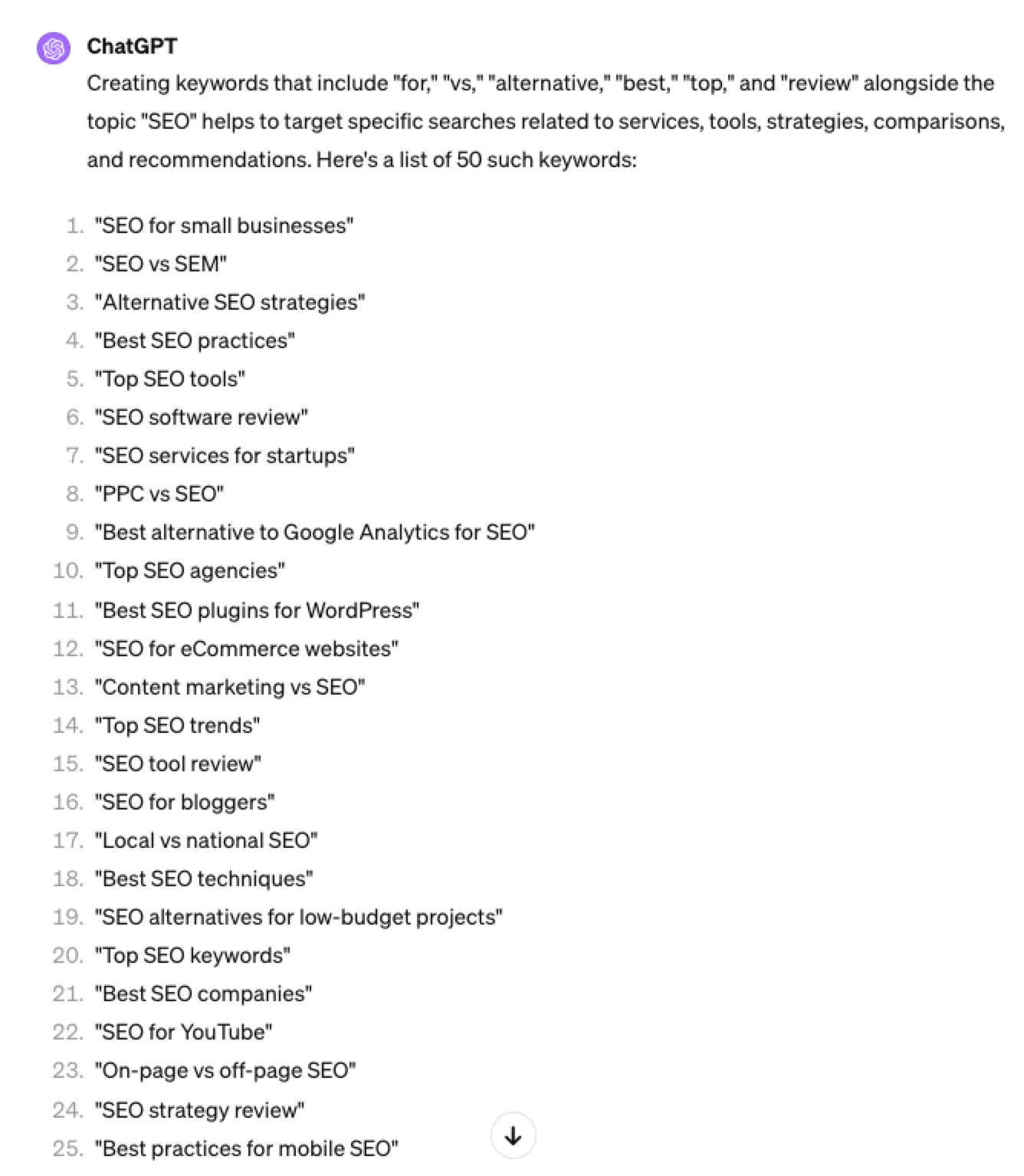 Screenshot ChatGPT 4, April 2024
Screenshot ChatGPT 4, April 20243. Brand Patterns
Another one of my favorite modifiers is a keyword by brand.
We are probably all familiar with the most popular SEO brands; however, if you aren’t, you could ask your AI friend to do the heavy lifting.
Example prompt:
“For the top {Topic} brands what are the top “vs” keywords”
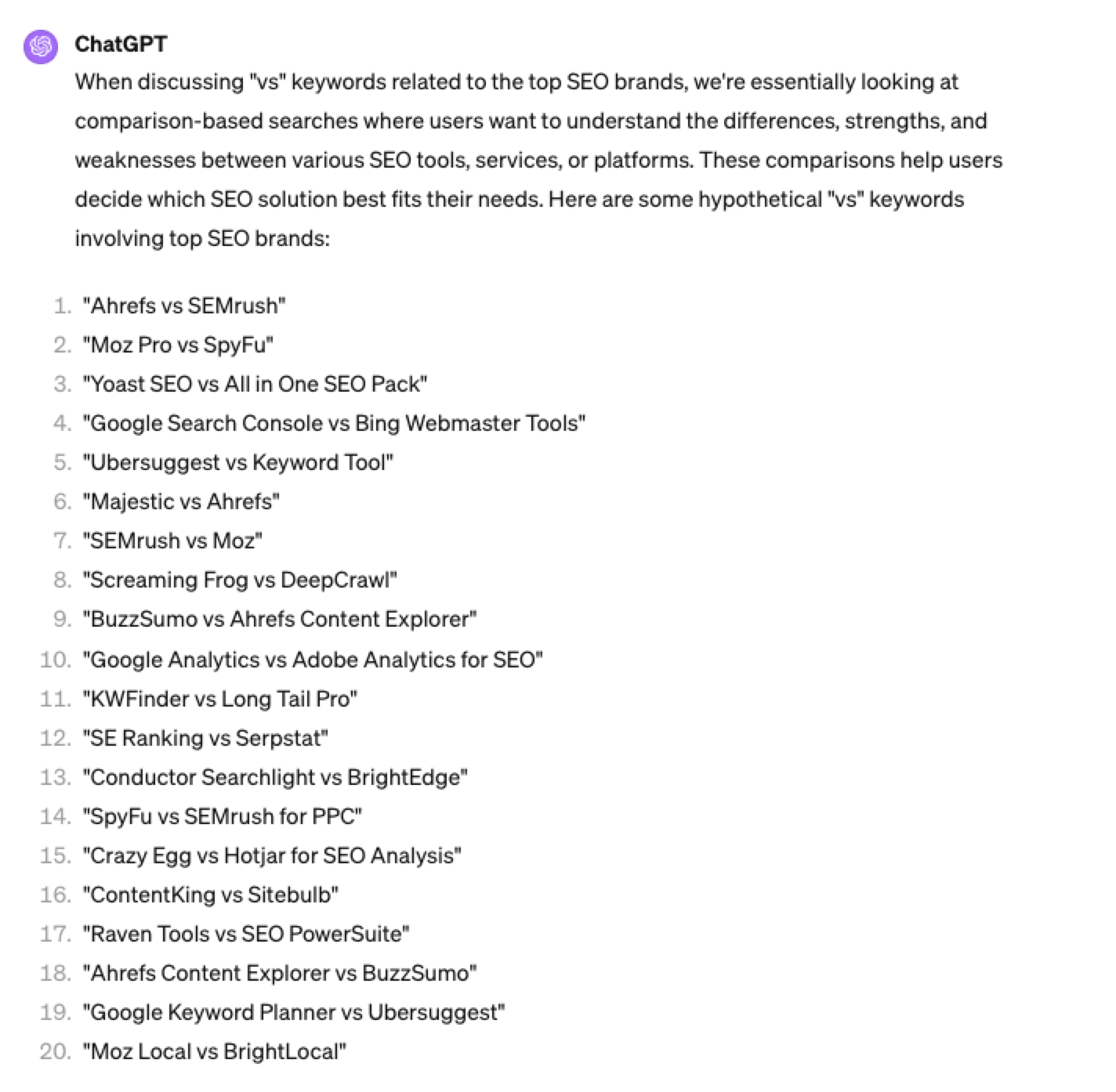 Screenshot ChatGPT 4, April 2024
Screenshot ChatGPT 4, April 20244. Search Intent Patterns
One of the most common search intent patterns is “best.”
When someone is searching for a “best {topic}” keyword, they are generally searching for a comprehensive list or guide that highlights the top options, products, or services within that specific topic, along with their features, benefits, and potential drawbacks, to make an informed decision.
Example:
“For the topic of “[Topic]” what are the 20 top keywords that include “best”
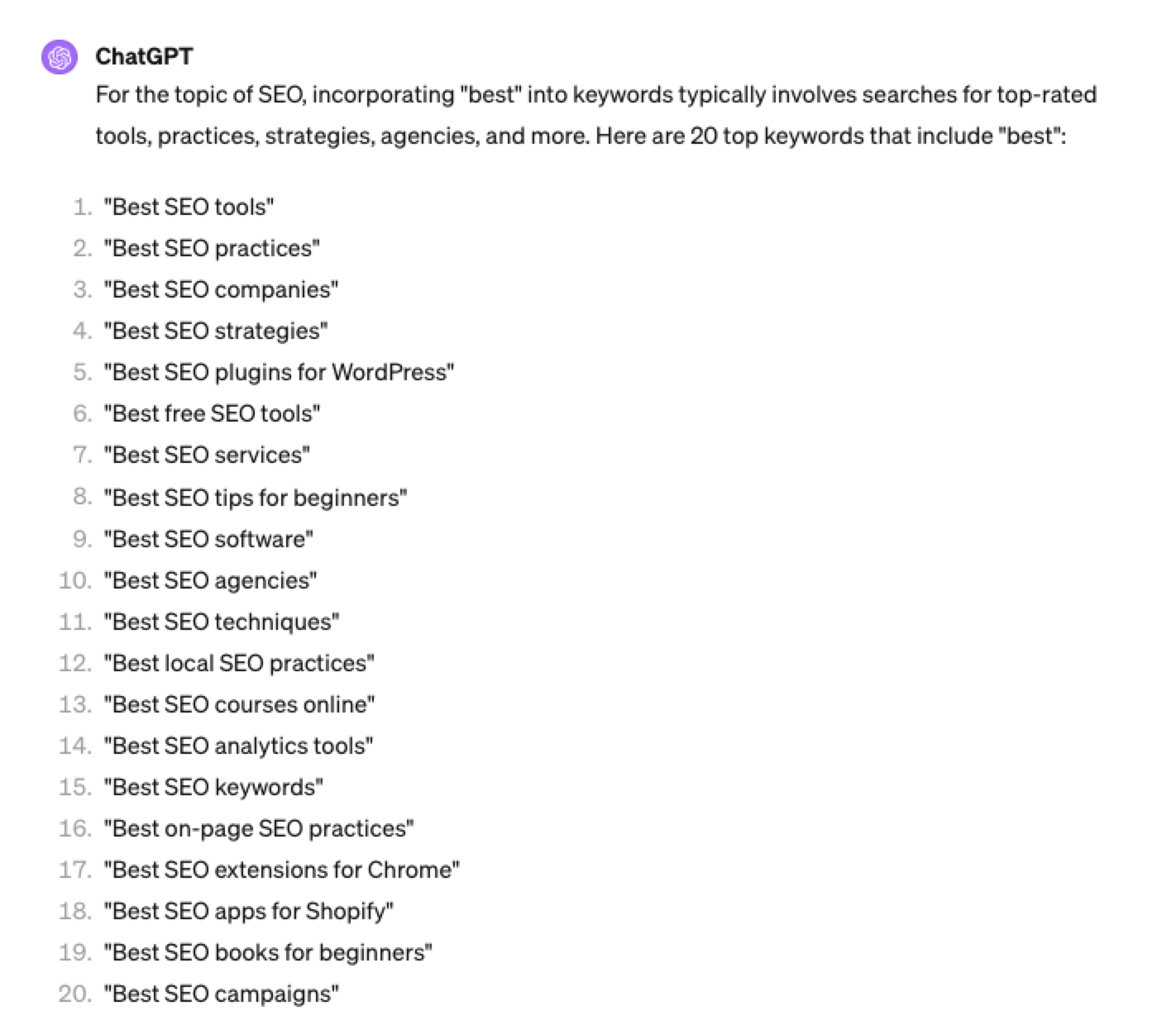 Screenshot ChatGPT 4, April 2024
Screenshot ChatGPT 4, April 2024Again, this guide to keyword research using ChatGPT has emphasized the ease of generating keyword research ideas by utilizing ChatGPT throughout the process.
Keyword Research Using ChatGPT Vs. Keyword Research Tools
Free Vs. Paid Keyword Research Tools
Like keyword research tools, ChatGPT has free and paid options.
However, one of the most significant drawbacks of using ChatGPT for keyword research alone is the absence of SEO metrics to help you make smarter decisions.
To improve accuracy, you could take the results it gives you and verify them with your classic keyword research tool – or vice versa, as shown above, uploading accurate data into the tool and then prompting.
However, you must consider how long it takes to type and fine-tune your prompt to get your desired data versus using the filters within popular keyword research tools.
For example, if we use a popular keyword research tool using filters, you could have all of the “best” queries with all of their SEO metrics:
-
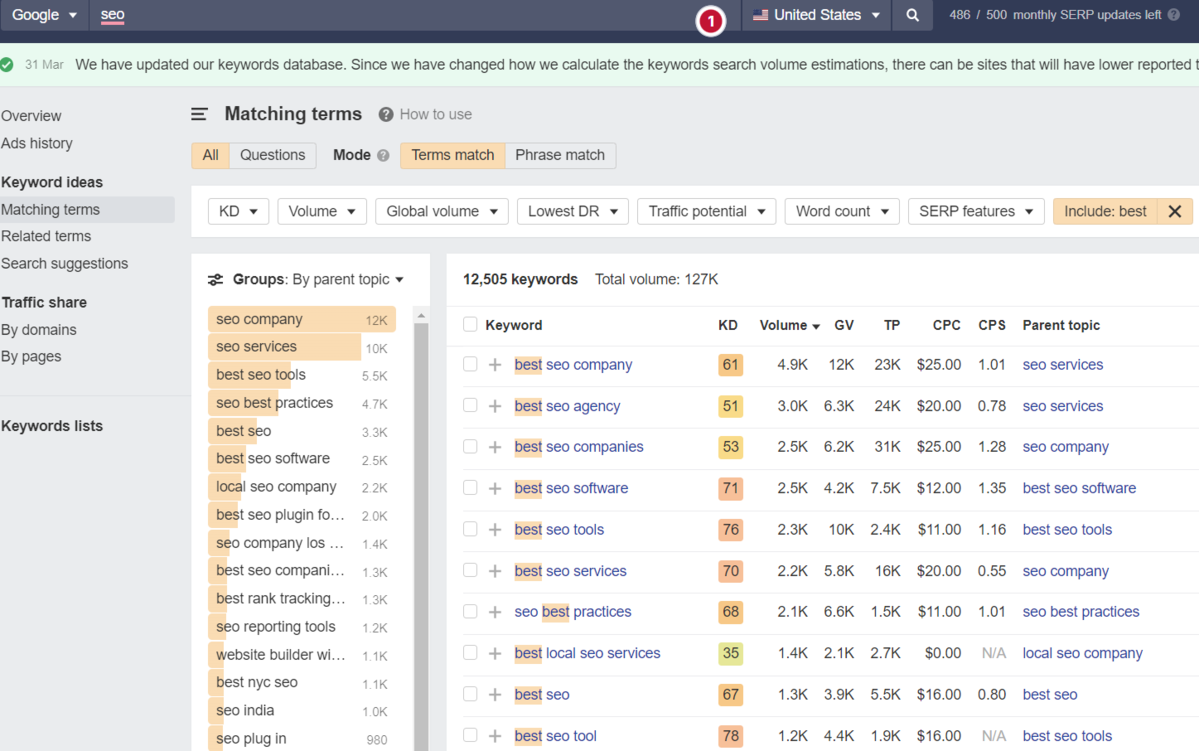 Screenshot from Ahrefs Keyword Explorer, March 2024
Screenshot from Ahrefs Keyword Explorer, March 2024
And unlike ChatGPT, generally, there is no token limit; you can extract several hundred, if not thousands, of keywords at a time.
As I have mentioned multiple times throughout this piece, you cannot blindly trust the data or SEO metrics it may attempt to provide you with.
The key is to validate the keyword research with a keyword research tool.
ChatGPT For International SEO Keyword Research
ChatGPT can be a terrific multilingual keyword research assistant.
For example, if you wanted to research keywords in a foreign language such as French. You could ask ChatGPT to translate your English keywords;
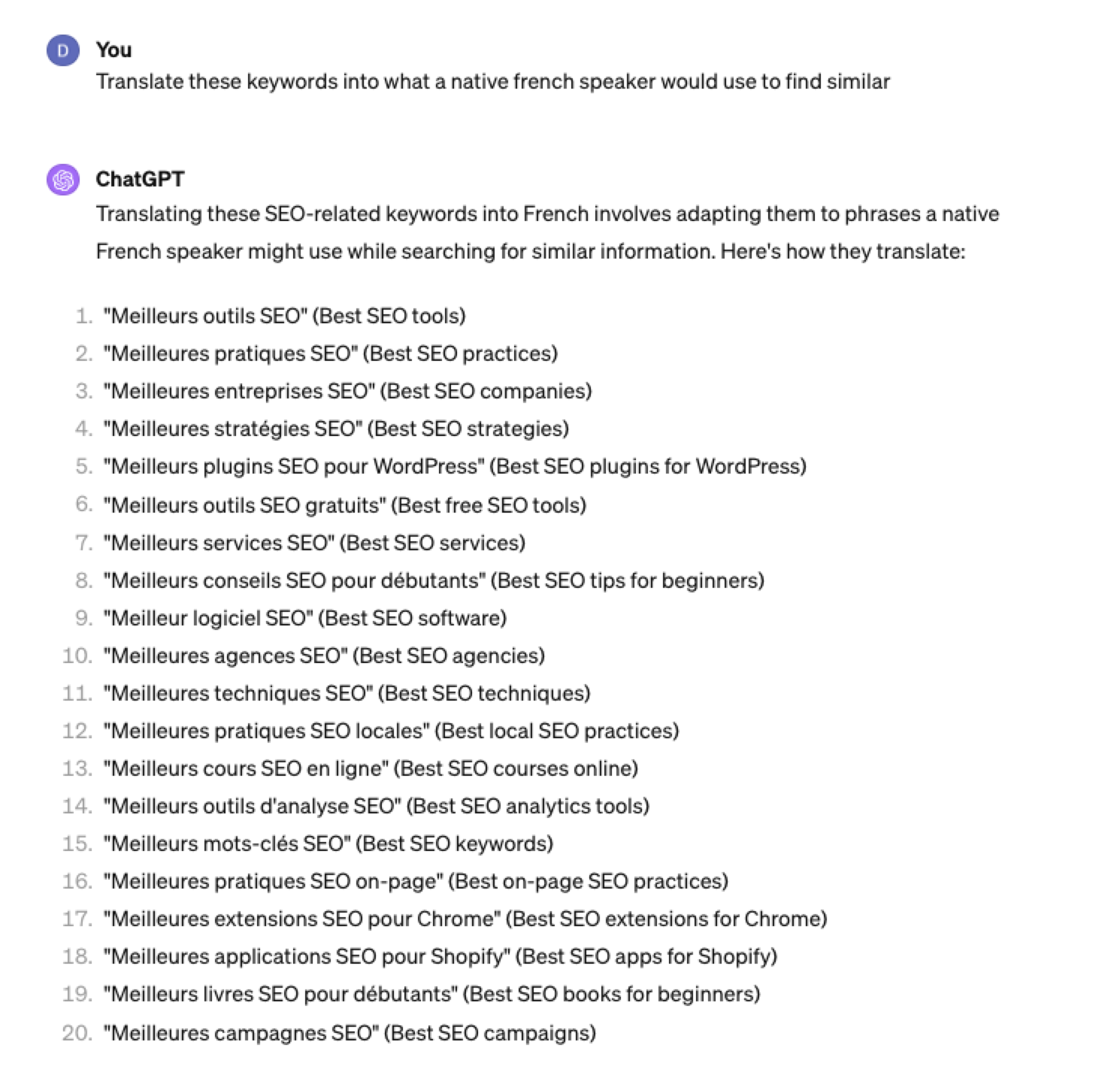 Screenshot ChatGPT 4, Apil 2024
Screenshot ChatGPT 4, Apil 2024- The key is to take the data above and paste it into a popular keyword research tool to verify.
- As you can see below, many of the keyword translations for the English keywords do not have any search volume for direct translations in French.
 Screenshot from Ahrefs Keyword Explorer, April 2024
Screenshot from Ahrefs Keyword Explorer, April 2024But don’t worry, there is a workaround: If you have access to a competitor keyword research tool, you can see what webpage is ranking for that query – and then identify the top keyword for that page based on the ChatGPT translated keywords that do have search volume.
-
-
 Screenshot from Ahrefs Keyword Explorer, April 2024
Screenshot from Ahrefs Keyword Explorer, April 2024
Or, if you don’t have access to a paid keyword research tool, you could always take the top-performing result, extract the page copy, and then ask ChatGPT what the primary keyword for the page is.
Key Takeaway
-
ChatGPT can be an expert on any topic and an invaluable keyword research tool. However, it is another tool to add to your toolbox when doing keyword research; it does not replace traditional keyword research tools.
As shown throughout this tutorial, from making up keywords at the beginning to inaccuracies around data and translations, ChatGPT can make mistakes when used for keyword research.
You cannot blindly trust the data you get back from ChatGPT.
However, it can offer a shortcut to understanding any topic for which you need to do keyword research and, as a result, save you countless hours.
But the key is how you prompt.
The prompts I shared with you above will help you understand a topic in minutes instead of hours and allow you to better seed keywords using keyword research tools.
It can even replace mundane keyword clustering tasks that you used to do with formulas in spreadsheets or generate ideas based on keywords you give it.
Paired with traditional keyword research tools, ChatGPT for keyword research can be a powerful tool in your arsenal.
More resources:
Featured Image: Tatiana Shepeleva/Shutterstock
-

 PPC6 days ago
PPC6 days agoHow the TikTok Algorithm Works in 2024 (+9 Ways to Go Viral)
-

 SEO5 days ago
SEO5 days agoHow to Use Keywords for SEO: The Complete Beginner’s Guide
-

 SEO7 days ago
SEO7 days agoBlog Post Checklist: Check All Prior to Hitting “Publish”
-

 MARKETING6 days ago
MARKETING6 days agoHow To Protect Your People and Brand
-

 SEARCHENGINES7 days ago
SEARCHENGINES7 days agoGoogle Started Enforcing The Site Reputation Abuse Policy
-

 MARKETING7 days ago
MARKETING7 days agoElevating Women in SEO for a More Inclusive Industry
-

 PPC7 days ago
PPC7 days agoHow to Brainstorm Business Ideas: 9 Fool-Proof Approaches
-

 MARKETING5 days ago
MARKETING5 days agoThe Ultimate Guide to Email Marketing










